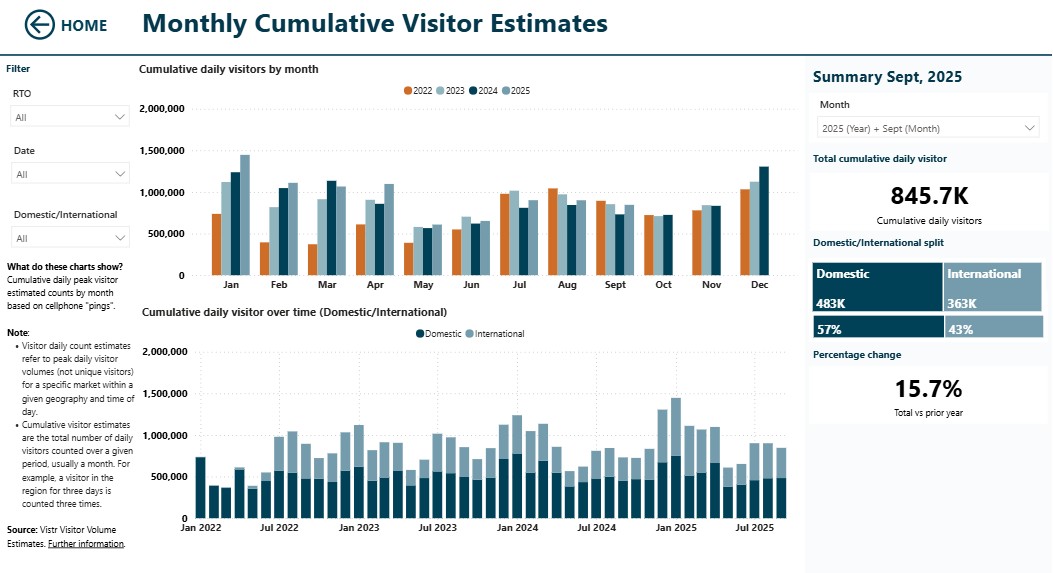Insights to guide the visitor economy: research exploring visitors, industry and residents.
Queenstown Lakes is investing in practical, locally-relevant research to guide smarter choices about tourism’s future. This initiative brings together visitor, industry and resident insight to understand motivations, pressures and potential outcomes. The goal is simple: evidence that directs action - so decisions strengthen community wellbeing, protect place, and deliver experiences that genuinely contribute. In a similar vein, a partnership with the University of Otago is connecting academic expertise with industry needs. Research students are helping test ideas and gather insights that will shape the district’s regenerative tourism journey.
Why research matters
Good research and data turns strategy into day-to-day management. It shows where and when pressure builds, how demand shifts, and which trade-offs impact resident wellbeing. Destinations need fit-for-purpose indicators and monitoring to manage tourism sustainably. Insights also support effective marketing - sharpening audience segmentation, optimising channel spend, and aligning promotion with destination capacity and community values.
The visitor industry and resident research workstream focuses on two core goals: first, improving knowledge of visitor motivators and behaviours through robust analytics; second, building an informed understanding of visitor interests and values to guide marketing and product choices.

What has been established?
Insights are shared with Destination Queenstown (DQ), Lake Wānaka Tourism (LWT), members and stakeholder partners. These are drawn from managing commissioned and publicly datasets, evolving research programmes to be inclusive of destination management considerations and supplying regular performance updates. The workstream also supports the establishment of a collaborative, data-driven measurement framework with QLDC and stakeholders - aligning indicators and reporting to inform Travel to a Thriving Future projects.
Several programmes have been refreshed or created:
- Emerging Travel Trends & Industry Shifts research: Signals and structural changes distilled to help businesses test new experiences and channels.
- Visitor Experience & Perceptions research: Survey evolution adds questions on sustainable and regenerative attitudes and behaviours, providing clearer visibility of demand for nature-positive, culturally respectful and community-minded experiences.
- High Contributing Visitor Index (HCVI): A composite benchmark of behaviours and values that align with the district’s definition of a “high contributing visitor”, informing targeting and tracking progress over time.
- Resident sentiment: Annual research using an established methodology to understand perceived benefits, adverse impacts and future priorities, offering an independent view of social licence and expectations
Member-facing tools and dashboards: A curated set of digitial resources on the RTO member hub (including the Visitor Insights Dashboard) provides timely access to destination data and guidance.
A growing collaboration with the University of Otago is adding a new dimension to this work. A pilot summer school and applied research partnership will connect postgraduate students with live industry questions, generating insights that bridge academic research and destination management in practice. Supported by the Economic Futures team and regional tourism organisations, this collaboration is expected to share findings through the Otago Tourism Policy School in 2026- an annual University of Otago forum that brings together researchers, industry leaders and policymakers to explore the key issues shaping Aotearoa New Zealand’s tourism future.

Closing the data gaps further
Despite progress, critical gaps remain around carbon emissions, biodiversity impacts, housing and infrastructure, and cultural connection. Next steps include expanding environmental and social datasets, aligning indicators with recognised destination and national standards, building stronger real-time monitoring, and exploring how to broaden resident research panels.
Next steps in the journey
This research initiative underpins the Destination Management Plan’s vision for Travel to a Thriving Future by supplying the evidence base needed to guide decisions and track outcomes. It advances Foundational Project 3: Data and measurement framework, while also informing Project 4 (Place-based destination planning), Project 7 (Measure environmental footprint), Project 8 (Measure greenhouse gas emissions) and Project 15 (Product evolution programme) - the pathways that move the district towards regenerative tourism by 2030.
Next steps include connecting datasets, refining shared indicators and piloting new ways of sharing insights. Opportunities to support will emerge as this work evolves, from following updates and sharing operational learnings to testing tools and resources when available. If you have any questions, feedback, or comments, please reach out through the contact form.


